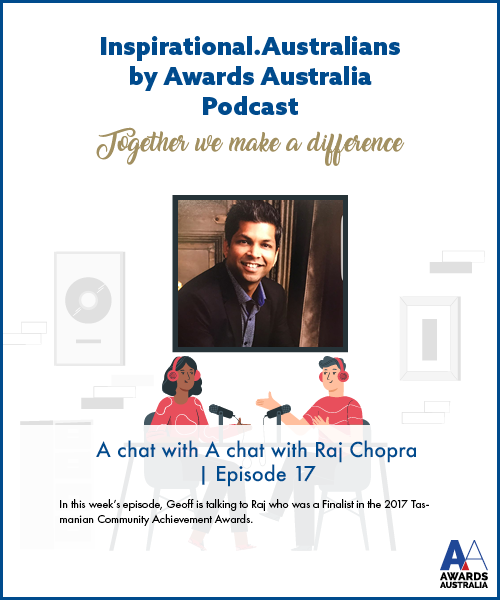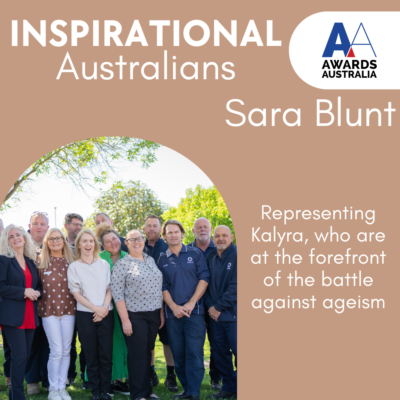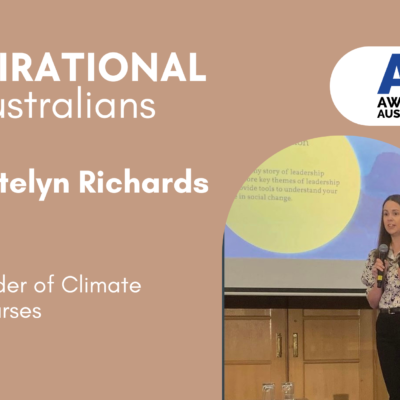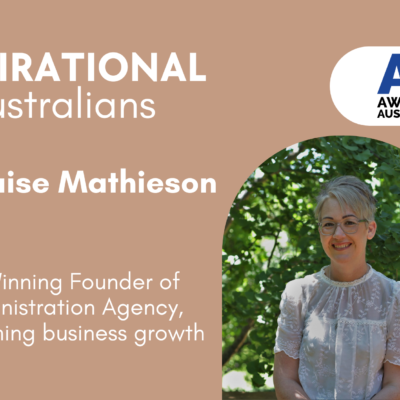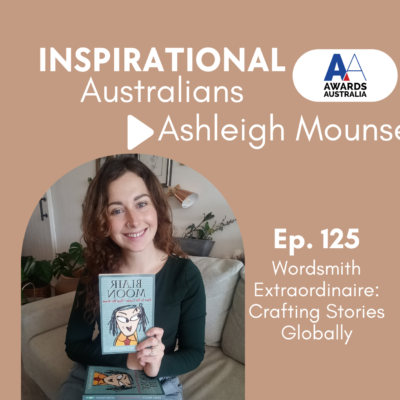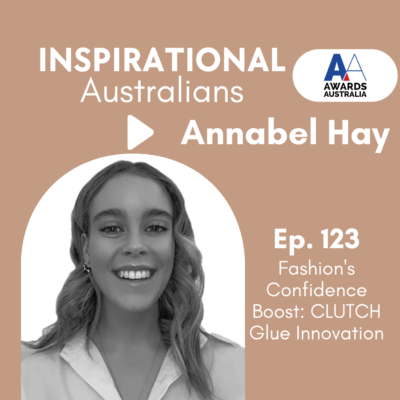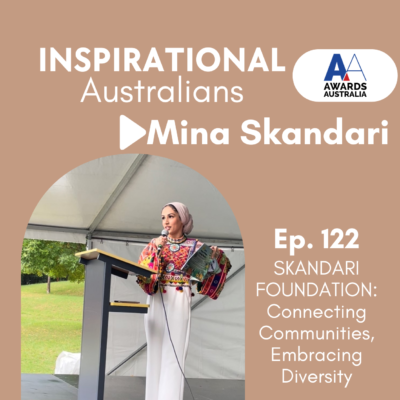In this week’s episode, Geoff is talking to Raj who was a Finalist in the 2017 Tasmanian Community Achievement Awards.
In founding an intercultural sports league, Raj Chopra has brought people from different backgrounds together to foster a strong Tasmanian community.
Arriving in Tasmania from India with his wife and their two-year-old son, Raj Chopra is all-too-familiar with the overwhelming feeling that comes with starting a new life in an unfamiliar country. Today, he is Founder and President of the Intercultural Sports League (ICSL). Its sole purpose is to bring communities together and draw people out of isolation through participation in social sport.
The league has now more than 600 members. There are teams from India, Nepal, Pakistan, Lebanon and Syria, and local Australian teams as well. It’s the first Nepalese team in Tasmania’s history! These participants have now created their own networks.”
Raj has witnessed friendships develop and confidence flourish. People from non-English speaking backgrounds have the opportunity to practice their English out on the field and cultural harmony is felt in the handshakes after hard-fought games.
In this episode:
- No grounds to play on for his cricket league? Hear how Raj overcame the problem with creativity and passion to make the league succeed
- Be amazed at how committed is to making a difference for all those new to Tassie
- Interested in watching the SBS Sidelines documentary? Click here
- Want to find out where you can get a free copy of the monthly Diverse Tassie community newspaper? Click here for locations
Links
Connect with Intercultural Sports League on Facebook
Connect with Diverse Tassie on Facebook
Want to help, donate or read more about the Intercultural Sports League?
Follow us on our Inspirational.Australians Instagram Page
Want to nominate someone? (It can take as little as 2 minutes to recognise someone making a difference)
Like some more information on Corporate Partnership?
Transcript
Annette (00:05):
Welcome to the inspirational Australians podcast, where we chat to people, making a difference in their communities and in the lives of others. And here is your host for today, Geoff Griffin.
Geoff (00:19):
Our podcast guest today was a finalist in the 2017 Tasmanian Community Achievement Awards and the Get Moving Tasmania Physical Activity Award in particular, Raj Chopra arrived in Tasmania from India with his wife and their two year old son as such, Raj is all too familiar with the overwhelming feeling that comes with starting a new life in an unfamiliar country. And I can only imagine how intense and stressful that would be. Raj decided to do something about it though, to help others cope with that transition. He founded the Intercultural Sports League with the sole purpose to bring communities together and draw people out of isolation, through participation in social sport. Raj, welcome to the podcast, Mate.
Raj (01:10):
Yeah. Thank you very much for having me, Geoff.
Geoff (01:12):
Oh, absolute pleasure and privilege. And I, I’m so excited by stories like yours, you know, and I, as I say, I cannot imagine how stressful it would be coming to a country that you don’t know, you don’t know people, and you’re trying to learn new culture, integrate into the community. So you’ve gone and done something about it. So I’m really excited to talk to you about that. Firstly, tell us what brought you to Australia and the feelings you had in those early days arriving in Tazzy.
Raj (01:42):
I’m actually from Delhi, which is, you know, a city of 5 million people in a 90 kilometer radius. Um, and I mean, I used to run my business there and it was a very hectic lifestyle and my son was born in 2010. Um, so I thought, you know, I have to do something about it, you know, not just get involved in business and live in a hot humid city for a long time. So we decided to move to Australia in 2013. Uh, and our first choice was Melbourne because a lot of people we knew who lived in Australia, they said, Oh, Melbourne is the best place to go. You’d never go to Hobart. Um, and you know, that was the first reaction of people who say, Hobart is something that you shouldn’t go there. There’s no jobs there. And, you know, it’s kind of a small village and stuff like that. And my wife was stressed out that, you know, we made a decision to move to Hobart. Uh, but I mean, I have no regrets at all, um, to moving to Hobart. And it has been an amazing experience. Um, since we’ve come here in early days, my wife had a lot of homesickness, um, and I can remember the first couple of weeks, she would cry, uh, because there was hardly any people she could find to talk. And, um, she had to go to the university to study and our son was only two years old. So she had all those mixed feelings that what exactly we are doing here. Why can’t we just go to Melbourne and stuff like that. But, uh, yeah, I mean all the normal feelings you have of leaving your home, uh, coming to a random place, but I’m glad, you know, we made that sacrifice in the start because Hobart has been such a blessing in our life. Um, and we just love living in this small city. It has everything you need, it’s kind of a heaven on earth. I would say many people from mainland might not agree with that.
Geoff (03:38):
Certainly very different to Delhi and even Melbourne, but Hobart is one of the most beautiful places on earth. I think it’s just such a lovely place and the people are perfect. So you did very well.
Raj (03:52):
Absolutely. I think, you know, if you come to Hobart, it’s difficult to leave. I have met a lot of people who try to go to mainland after living in Hobart and they always returned back and they say, well, we just don’t know why we left. Do you actually leave Hobart? It is amazing landscape. The weather is always cold, which is perfect for people from Delhi. We love cold weather. You need a blanket whole year around.
Geoff (04:20):
I’m not sure about the cold weather part but you’ve convinced me on everything else. We actually moved to Sydney many years ago and just moving state was really difficult for us to learn, uh, the local, uh, why people do things and to learn about rugby, but also to, um, not have friends that was really difficult. So I definitely feel for you and everybody who comes and tries to integrate in the community. Of course, you’ve done something about that. And you’ve very clearly passionate about helping others to integrate into the community and feel that sense of belonging. Can you tell us how the Intercultural Sports League came about?
Raj (05:05):
I mean, look, when we moved here, that was one of the challenges because there was not many migrants living in Tasmania that point of time there, my vision has only grew here in the past five years. Um, there was no Indian grocery shop here. There was a place from Asian supermarket, where you would buy spices and stuff like that. And I, I found a job. There was no problems with the housing or anything like that. However, I really felt isolated that how do I actually connect with people? What can I do to meet and make new friends and stuff that can entertain the whole family? And we can do something together because you know, you realize that there’s no friends around you, you kind of feel lonely after a time, whether you have a good job or a house, it doesn’t matter. How much can you look at the same rate if you don’t know people? Um, and I got along couple of people I knew and coming from India you will know, the only thing in me is know is how to play cricket. Uh, so we thought that, you know, cricket is the best medium. Uh, if we have our team, we create a team and start finding people. Um, in that way, you know, at least you have time to catch up and do something on a weekend. And so a couple of us got together, put a team together of six or seven people that we knew, uh, who we can meet, uh, by asking them, we’re going to buy you lunch if you come and play for the us. Um, and so we hooked up one day at the ground. And the major thing we realize that in Australia, you have to book grounds to play. Uh, if the grounds are actually owned by council and by clubs, uh, who are established here from many years. And when you realize that when one day we were playing and a couple of people showed up saying, have you got a booking for this ground? And we’ll say, what, what do you mean by booking? So you need to book the ground to play through council. Actually I said guy, and he said, well, you can play in the competition that cricket Tasmania runs here, if you have a ground. So I’ve been to the council office to ask about the ground and say, and they said, well, there are no empty grounds available at the moment in Hobart, because most of them are already committed to the existing clubs. So we went to every single council we could, uh, to cricket Tasmania. And they said the same thing to play in the competition. Cricketers, you need to have a home ground. Um, however, that didn’t stop us. So we thought that, you know what we can do, we can launch our own competition where you don’t need a home ground, and we just share grounds with people. So that was a bizarre idea. A lot of people didn’t like that idea, but I just created a flyer. Um, and you know, paste it in Coles and Woolworths and in one week time, we had six teams enrolled to play. And I realized that they were in the same shoes as us. They did not do how they can play cricket without booking a ground. So I created the, we created together this umbrella body call into Intercultural Sports League and then I went to the cricket body here saying we got six teams now and they all want to play cricket. What can we do? And they embraced the idea. They said, well, this is actually really exciting to see 6 teams have enrolled in a matter of one week. Um, so we can speak a couple of schools. Uh, the school grounds are not that top-notch quality. However, it’s just a ground to play. And we started the 2020 competition, uh, a very small one. And I think, you know, it has been an amazing journey since five years, uh, as we created something that never existed here, uh, you know, we share grounds with existing clubs now when they are not playing, we use their ground to run up to the competition. So that’s how it came about and what it has seen, just establishing the relationships in Hobart. And now there is hardly anywhere I go when I don’t meet someone, I don’t know. And I know them because of this wonderful game of cricket.
Geoff (09:11):
Yeah. And I bet you’re teaching all the Tasmanians, uh, how to fall spin, uh, which is not something except for a few know how to do very well. That’s, uh, that’s amazing. You mentioned six teams. Do you still have six teams?
Geoff (09:30):
Uh, so look, we started with 6 teams, this is our fifth year we are running. Um, and this year we had to draw a line and, uh, we had to say, we are not going to have more than 14 teams. So they got 14 cricket teams, uh, this season. And I don’t think we will be able to accommodate any more than that. We had 21 cricket teams apply to play and we had to choose only 14, because again, there is a massive issue of, uh, you know, grounds and facilities. So we have to, you know, understand that as well that we just can’t push the limit. Um, we’re, we’re trying what we can best. And some of the other teams might, you know, play for other clubs and stuff like that. So, yeah, we’ve got 14 cricket teams have grown from 6 to 14, more than 250 active players who are going to participate this year.
Geoff (10:22):
Fantastic. That is one extraordinary story, starting from someone who understands what it’s like to be isolated, to be lonely, to be alone, to do something like this to integrate people. And as you said, now, you can go nearly anywhere and you’ll recognize someone that you’ve met through the Intercultural Sports League. So do people gathered together subsequently in social environments as well, or is the game, you know, bringing family and making a day of it too?
Raj (11:00):
So what we do basically every year before the launch, uh, what we do, we have a big launch where we invite all the team members, their families, local cricket clubs, uh, local politicians and we have a big feast. We put out DJ music this year. We had the launch a couple of weeks back where we had an exhibition match of women’s cricket, uh, where all the mayors of Colbert and Glenorchy participated in that as well. Um, and so we’d do things like that. Plus we create a group called uh, the Captain’s Group. So every 15 days, the leadership of all the teams, uh, catch up just to see how things are going, anything we can support each other, uh, how we can network. Uh, many of the people who actually play in the league are our sponsors as because cricket is a very expensive game of long livable cost of $50. Um, so in a day, one cricket game can cost us around $400. So you can imagine on the weekend, we have 12, six different games plight for 12 teams, uh, 2020. So that costs us a substantial amount of money. So captains and the teams pay a registration fee and the local businesses, uh, pitching a lot of money as well to support that. So what it has done it has provided a network, uh, where you be connected, finding jobs for each other. Can I share a house with you? Uh, you know, if there is any problems, can I, can we help you and stuff like that. So there has been a massive, you know, different mutual benefits as well for each other, uh, to catch up. And our kids are able to know each other. We can meet people from, you know, I would’ve never get a chance coming from India to play with someone from Pakistan in the same team, but in Hobart, we can do that. We have a team, uh, which is, um, you know, the captain is from Pakistan and most of the players are from India and they will own last year premier ship. So it is just an amazing example, um, that it has broken all those boundaries, um, you know, and cricket that brought people together in one family.
Geoff (13:16):
Yeah. I think it’s wonderful that you’re using all of the benefits of living in Australia to bring people together, to appreciate each other’s cultures. And what sort of Australia has to offer, uh, just amazing. What are some of the countries that are represented in your league?
Raj (13:36):
I mean, uh, this year, for example, I’m in STEM space starting, but this year we have two teams from Nepal, one team from Bangladesh, one from Sri Lanka, two teams from Pakistan, of course 4 team from India, and then we’ve got two Australian teams, uh, local people here who have players from Syria, Greece, Lebanon and then we have people from Peloton who are playing in the league, Afghanistan. So pretty much every sub-continent country you can think of, who play cricket. Um, they are involved in that. Plus we got people from UK. Uh, there’s one guy from America, uh, who’s playing as well. So very mixed. I can say about 12 to 13 different countries represented in one league.
Geoff (14:27):
That’s some absolutely amazing, and it’s such a learning to be able to experience and understand and appreciate other people’s cultures as well, that you may not normally even get to experience or understand. So I think that’s, you know, there are so many byproducts of what you’re doing, as you said, it’s, it’s a learning, it’s a social integration. It’s, uh, helping people find employment. All the things are so critical to people who come to Australia and one to make their home in their lives here. I’m just blown away by, you know, what you do and the real impact, the broader impact in the community that has, you know, there was some real inspirational or success stories that come to mind as a result of being involved with the league. Can you think of any, uh, that people, uh, would be interested in hearing or that come to your mind, you know, in terms of that inspirational success?
Raj (15:24):
Yeah. I mean, I can give many examples, but for the real success, we will count. As you know, um, we have a premier league competition here called cricket Tasmania Premier League, which is played on tour. And last year we had 41% players from ICS played in that competition. And many of the players have played grade one cricket, a lot of local clubs have got into, you know, ICS and they have key players from ICS to play in the local clubs as well. A specific example there is a player by the name of Nooarn. You can check him from Tasmania. Uh, last couple of years back, he came to ICS to connection, played for Glen OPC club. And last year he switched and played with UTAS University of Tasmania in grade one and he scored a double century. He became the eighth player in the history of Tasmania in grade one to score 200 plus rounds in a one day match. So that was really good. And, and there are many other stories, but one particular thing, I think as a very big success is a movie that SBS produced last year called Sidelines. Sidelines is a short documentary about a lot of people, you know, I think that how local people would interact with migrants and then the big notion that people don’t get along and stuff like that. And that story particularly counters that it’s the story of two local people who live here facing similar issues from health and housing issues and stuff and they brought a team together and you know brought people from different background together to play with them, supporting them. So that story became really popular. And then cricket Tasmanian, cricket Australia saw it, Cricket Tasmania did tell us that it will advise every staff member watch that to understand the impact ICS has had on the local community and how it has actually broken those barriers that should I speak with this person first or not? And as you said again, and again, I’ll say, yah is such an amazing multicultural society. It offers us that place to foster that relationship and help us integrate with each other. And cricket has become that mechanism for us.
Geoff (17:53):
Yeah, just a, an awesome story. And I think that documentary Sidelines would be amazing to see myself if I can Google it and find where I can have a look up, really truly inspirational story. And your story is really inspirational as well. I hope this has been replicated in other states as well. It’s such a great idea. Uh, I absolutely love it, uh, as you’ve probably gathered, cause I’ve said that I think about five times you, are you involved in any other community activities or don’t you have time?
Raj (18:27):
Yeah. I mean, look, I worked full-time, uh, five days a week. Uh, however I am involved in, we launched the first multicultural newspaper for Tasmania called Diverse Tassie as it never existed before. So that has become another platform for people to, you know, raise their opinions, have connection and speak if they want to. A lot of times the mainstream media might not pick up your stories, but we publish anything that is on your heart. I’ve also worked with Madagascar council for a long time as a project officer and I’m on their board recently as well. So, you know, I try to be in here around and see how we can support each other. I, my biggest philosophy is, you know, your network is your net worth and that’s what it’s all about. The more networking you have, the more you can stay connected with each other.
Geoff (19:25):
I like that in network is your net worth. I love that. It’s very cool. Well, you’re clearly very motivated. What drives you your passion to keep going and to make such a difference for others?
Raj (19:39):
I mean, one of the biggest motivation that I have to continue to do that is for my personal sanity, because you know, I mean, you could get engulfed in too much of working and buying a house and materialistic thing which is important for the family. You know, I do want to do that, but when you look back and say, what else have I done where I did not do it only for the money or for the financial reasons. And I see myself invested and I was there any other community organization when I do work with them as a complete volunteer, that is my personal satisfaction to see that I’m doing something for this amazing state of Tasmania, which has given us so much, it has given us a livelihood, a beautiful family here, a lot of support from local politicians, counselors, cricket Tasmania, everyone has embraced whatever we have brought on the table. So it ended up a time to, you know, pitch in back and say that, what are we going to do to help people who migrate here to understand that what Tasmania has to offer and what are you going to do to make a difference? Um, because you know, at the end of the day, it’s all about how we are able to tolerate each other. Uh, and if we can teach all of us or, you know, somehow come to a conclusion that how we can live in harmony with each other, that is my passion. And that is my motivation.
Geoff 21:13):
Oh, that’s fantastic. I love that. Just changing pace for a moment. What’s something that we might not know about you?
Raj (21:22):
I mean, one thing you might not know coming from a Delhi, I’ve lived in an apartment and we don’t have the luxury of having gardens there than anything like that. And I do enjoy a lot of gardening, um, that has become one of my passion here. Um, and recently when COVID-19 happened, I’ve been in the shade house. I never had any skills in constructions and anything like that, but I managed to build one and I’m growing vegetables there. And I spent every Saturday morning, I spent five to six hours, uh, just in the garden with the plants and grass and flowers. And that brings me a lot of joy. So a lot of people from Delhi would say you know, gardening, why do you need to do that to grow one tomato, you’ve spent hours and hours, but this is something that I really enjoy doing.
Geoff (22:19):
It’s such a privilege to see things grow to, uh, to watch the fruits of your labor, so to speak as you do with the Intercultural Sports League as well, you’re seeing people grow, but yeah, I think that’s fair to say, what’s your favorite vegetable that you’re growing or fruit?
Raj (22:39):
I mean, I love growing tomatoes because firstly they’re very expensive to buy it. And in Indian food we use a lot of tomatoes for the curry. So last year I was quite successful from January to May. I did not have to buy any tomatoes. So we, we go a lot of tomatoes and chilies. I love growing chilis as well, which is another thing that goes with every meal that we eat. Um, and I grew eggplant last year and they are really expensive to buy as well. So I try to grow things which are quite expensive. Then I can reason with my wife saying, well, I pulled all that, but look how much money I saved.
Geoff (23:28):
Well, it sounds like a win-win, you’re getting some peace and serenity from, uh, being in the garden and saving money as well. Perfect
Raj (23:36):
Yeah, absolutely
Geoff (23:38):
Raj, do you think, um, going back to 2017, that becoming a finalist in the community achievement awards helped with the Intercultural Sports League, do you think that, and for you personally, do you think that really made a difference?
Raj (23:55):
Absolutely. I think we were nominated by one of the friends we knew here, he’s a local coach. And I think when we heard about the, we are the finalists, we got to attend a gala dinner, uh, with all 500, 600 people, of course, you know, that was not the COVID-19 time at that time. And I think it was, uh, quite an emotional moment for us as well to say that, look we’ve come from a different country, but how much love we have been given by the local community here that was, that really made a difference. A lot of people recognize the us. And after that, you know, it put us on a pedestrian where it became a little bit easier for us to get a little bit of a favor with some other sponsors and stuff like that. And it just on a personal note as well, you know, when, if you are doing something, sometimes you don’t have time to reflect back and sit down and say, have I done anything which made a difference and those award for just sitting down and listening to, you know, what we have done and why they have chosen us, uh, what was a quite powerful moment and that motivates us more to do more and more things.
Geoff (25:09):
Yeah, that’s terrific. Certainly it’s a great validation, isn’t it for what you’re doing and a recognition, as you say, that can actually impact others to find out about services and gives you that credibility for whether it be finances or grants or other people to come in and join the teams. So, yeah, that’s awesome. We’re so pleased. And I remember sitting there and watching and listening to your story on stage and thinking, well, this is really powerful, but I guess I didn’t at that time as you wouldn’t and couldn’t fully understand the impact that you’re having. And I’m sure you’ve grown significantly since then. So maybe you should be nominating for the awards again. Well, the 2021 Young Achiever Awards an hour open for nominations too. So that is for young people who are under 30. Would you encourage our listeners to nominate a young person they know for an award like this and you sort of touched on it, but can you just expand a bit more on how much it meant to you to be nominated and to become a finalist?
Raj (26:20):
I would definitely encourage. I mean, if you know anyone or if we know anyone who’s doing, some remarkable work, I think they need to be recognized. And it only takes you half an hour of your time to nominate someone or maybe a little bit more, but that makes a huge difference in the life of someone who’s just, you know, working hard and doing all this work voluntarily, uh, in their personal time. And we know a lot of people in Tasmania, some of the young, um, uh, you know, talent that we have is just amazing. And I think, you know, people should be nominating the young people. So, you know, they are motivated to give back more in Tasmania and, and there, and I think one of the biggest reasons for them is to nominate people that give them an opportunity to just say, well, look what Tasmania had to offer. If someone from Tasmania will see a far, uh, it’s just, you know, a powerful story to tell to the whole country and beyond. And then it gives them a reason to stay in Tasmania because we faced a lot of challenges and a lot of young people move out. Uh, the young talent moves out of Tasmania and if you recognize the people who’ve done a lot of work and give them a reason to stay here, uh, that them reflect upon that how different, how much difference they are making. And if they continue to stay in Tasmania and look for us in Tasmania, that’s the, that’s the best thing anyone can hope for.
Geoff (27:47):
Yeah, that’s so true. Very well said. Thinking about them from a politician. Raj, putting you deepen meaningful, head-on, what’s something that you think the world needs more of right now?
Raj (28:03):
I think at the moment, you know, with the COVID-19 environment, uh, one of the major things that we are focusing on at the moment, um, is, you know, the mental health of people migrating from different countries, to Australia as well. Um, as that became a very major task, uh, you know, coming from an Indian background, I can say that, you know, people don’t want to talk about mental health at all, living in a patriarchal society, um, and many other, uh, hurdles people have. So I think one of the biggest things at the moment, right, at this moment where people need is to support each other and, you know, the, the good program that we have R U OK day and stuff like that this year, they came up with, if you say, are you okay? What’s the next sentence you are going to say. So I think that time has come, that people stopped taking that next step saying that, just asking a question is not enough. I do need to support someone who is in need, uh, starting with your neighbors, starting with your friends, uh, people, you know, um, and I think that’s what we need to do if everyone, you know, takes up that responsibility, uh, that we don’t all try to play a little bit of a small role in helping one person. I think that would make a huge difference, but that’s when he said the moment. I think, you know that, and I think that’s Tasmania has and Australia has already displayed a huge amount of support for a lot of international students and migrants. I know a lot of programs that are running. It has already shown that what we can do. Um, so yeah, my opinion would be, you know, all we need to do is just take the next step up after, you know, when somebody’s in need, what are we actually going to do to help them?
Geoff (29:55):
Yeah. Kindness, being kind and thoughtful. We just don’t know what’s going through someone’s mind or what their experience has been. Recently, some people are doing it very tough. And we just need to be conscious that, uh, being kind is so important for people. You think of a previous winner of the Young Achiever Awards, Mitch McPherson, who started Speak Up! Stay Chatty such a, an a powerful story as well. I think you’re right though. We just need to be aware of people, be kind and share our story and ask people how they’re going.
Raj (30:39):
Yeah, I’m in and on talking about Mitch, Mitch has played in ICS and, um, a couple of times, and, uh, we are partnering with Speak Up! Stay Chatty which is this flagship organization and such an amazing work they are doing. They’ve developed the sports program this year. So ICS has partnered with Speak Up! Stay Chatty to run some of their programs, um, during the next four months at all our games. So I think that’s another powerful example that Mitch has not left Hobartand we are so glad to have him in Tasmania.
Geoff (31:12):
Well, I think, uh, Hobart’s pretty lucky to have you as well, to be honest. So, uh, what is, what is next for Raj Chopra?
Raj (31:23):
Uh, the next is, I mean, we are working towards at the moment, um, of developing a platform, where we involve more women in cricket. Uh, and that is the next project we are working on. We are about to launch our women’s cricket team here, which we’ll see girls coming from different countries from India, China, and places where cricket is not that popular for women. So that is the next step we are working on the big project. Um, and it’s about to be launched very soon. On the professional front, I’ve started working with a new organization called Steps as a charity nonprofit. Um, so yeah, that’s about it then. I don’t know what tomorrow comes. I’m a kind of a guy, if somebody comes with a good idea and they want to launch it, I’ll probably put my hands in there as well.
Geoff (32:20):
Uh, you’re a good guy to know. So I think the women’s competition integrating young women or women into connection with other people from all cultures is really invaluable as well. And I certainly applaud you, you’re thinking about doing that and integrating that.
Raj (32:41):
And that will make all the wives happy because I’ve stolen their husbands for the weekend to play cricket. So they’ll have something to do with it as well.
Geoff (32:49):
About time, they got their own back. I love it. So what’s tell me, uh, in a couple of sentences about Steps, what did you do?
Raj (32:58):
Uh, I’m the business development officer here. Um, and we work with, um, a lot of people who might have disability in finding an employment, um, and the, our RTOs, well, so we run programs, certificate training, and digital support and stuff like that. Steps into 40 years old organization, amazing work that they have done and it’s just, um, I’m so blessed to find an opportunity to work with them.
Geoff (33:27):
Well, I think they probably equally as lucky. And so your whole life is, is spent making a difference to others, which is what our purpose is. So it’s certainly an honor speaking with you. Do you have any words of wisdom or advice and encouragement for our listeners?
Raj (33:49):
My words of wisdom and encouragement would be, you know, if you meet someone from a different country, uh, I think the best thing you can do is just go say hi and break that ice. Um, because every time what happens, the hurdle is people think that person might not want to speak to me. Uh, how would they react? And if you just say, I know we are all the same, uh, you know, people, I think react in the same way when you are saying in a friendly manner, hi, or hello to them. So my advice to everyone would be just like we did. We just walked into people and say, hello and introduce. If you don’t ask, you never get so ask some friendship, and you will get some,
Geoff (34:33):
Yeah, that’s fantastic advice. You made me think this morning, my wife and I went for a walk and there are two, um, uh, Chinese ladies walking on the other side of the road and I wave and say hello to everybody, but I waved to them. I said, hi. And they looked at me really weird. And then all of a sudden big smiles and they both wave frantically. I say, hello, you know? So, um, it doesn’t take much and it costs you nothing to say hi to smile or whatever it is. So I think you’re right. And that’s fantastic advice go up to people, you know, say good day, they might be shy. They might be worried that you might not want to make them feel welcomed, or you might not like them, whatever it is for anybody that goes forward, just saying hello and breaking that ice and making people feel welcome in their own space. It’s really important. Raj, how can people, our listeners connect with you?
Raj (35:38):
I mean, we do have, uh, uh, our website as well called nterculturalsportsleague.com and the website, diversetassie.com.au. Uh, we have a Facebook page for both the organizations as well. So if people want to connect with us, they can definitely send us a email or send us a message on Facebook. And we will reply to them. Um, anyone who wants to play cricket, there’ll be parks community, um, looking for any connections in the local community, more than happy to connect with us and contact us for any of those details.
Geoff (36:15):
Brilliant. Yeah. Anybody who wants to promote a multicultural intercultural activity, they can contact you at Diverse Tassie as well.
Raj (36:24):
Absolutely. So, I mean, if anyone wants to publish anything or they have an event coming up, um, they can definitely send us the details and we will publish it on our website, send it to all our subscribers and put it on our Facebook page as well.
Geoff (36:39):
Awesome. Well, Raj, it’s been such a pleasure and a privilege to chat with you today. Thank you so much for coming on the podcast, giving some insights into what drives you to make a difference and the extraordinary difference you do make in your community. It’s been wonderful talking to you.
Raj (37:00):
Thank you very much for your time. And I really want to thank Awards Australia, uh, for the work they are doing and, uh, reaching out to people like us in regional areas, uh, helping us share our story, which is, uh, if you guys don’t do that to, you know, maybe people won’t have an opportunity to hear what we have to say.
Geoff (37:18):
Yeah, thank you, Raj. That’s very kind. We’ve been doing this for over 30 years and it’s, every day is special. It’s an opportunity to make a difference in someone’s lives. And that gives us the greatest joy and privilege to, um, to get up every day and to continue to do what we do. So thank you, Raj. And, uh, till next week, take care, be kind and be the difference for someone cheers, mate..
Raj (37:47):
It was great talking to you!
Speaker 2 (37:47):
I hope you enjoyed today’s interview as much as I have. We would love you to subscribe to our podcast so that you won’t miss an episode. Join us each week, as we talk with ordinary Australians achieving extraordinary things. Did you know that Awards Australia is a family owned business that proudly makes a difference in the lives of those that make a difference for others. And we thank our corporate and not for profit partners for making our awards programs possible. Do you know someone that’s making a difference or maybe your business might like to sponsor an award, contact us through our Instagram page, inspirational.australians or head to our website awardsaustralia.com. It would be great if you could share this episode with your network because who doesn’t like a good news story and please rate and review us. We would really love to hear your thoughts until next week, stay safe and remember, together we make a difference.
Annette (38:51):
Thanks for joining us today on the inspirational Australians podcast, we hope you enjoyed listening and have been inspired by ordinary Australians, achieving extraordinary things. So it’s goodbye for another week. Remember, together we make a difference.


